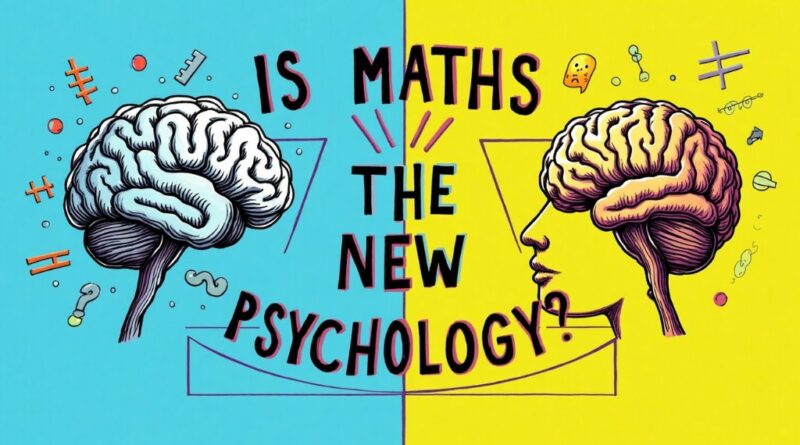Mathematics vs. Psychology: The Rise of ‘Choice Engineering’
In a breakthrough that could revolutionise how we understand human decision-making, researchers have demonstrated that mathematical models can more effectively influence choices than traditional psychological intuition. This cutting-edge approach, dubbed ‘choice engineering’, represents a paradigm shift in behavioural science with far-reaching implications across multiple fields.
Beyond Nudging: A New Era in Behavioural Science
For years, behavioural economists have relied on ‘choice architecture’—the practice of subtly influencing decisions through psychological principles such as anchoring and primacy effects. The concept gained worldwide recognition when Richard Thaler received the Nobel Prize in Economics in 2017, spurring governments worldwide to establish behavioural insights teams.
However, a groundbreaking study published in Nature Communications suggests we can do better. The research, led by Prof. Yonatan Loewenstein from the Safra Center for Brain Sciences at Hebrew University, introduces ‘choice engineering’—a data-driven method that employs computational models and optimisation techniques to shape behaviour with unprecedented precision.
“Our study shows that just as engineers use mathematical models to build bridges or design aircraft, we can use models of learning and decision-making to influence behaviour—reliably and efficiently,” explains Prof. Loewenstein.
Putting Theory to the Test: The Academic Challenge
To evaluate these competing approaches, the researchers orchestrated an international academic competition. Teams were tasked with designing reward schedules that would influence participants to choose one of two options with objectively equal value. The competition pitted intuition-based strategies against computational models in a real-world test of effectiveness.
More than 3,000 participants took part, each experiencing one of several different reward strategies. The results were definitive: mathematically optimised approaches consistently outperformed those based on psychological principles alone.
The Winning Formula: CATIE Model
The most successful approach emerged from a computational model called CATIE (Contingent Average, Trend, Inertia, and Exploration), developed by Dr. Ori Plonsky and Prof. Ido Erev from the Technion-Israel Institute of Technology.
Unlike traditional machine learning algorithms such as Q-learning, CATIE integrates multiple behavioural tendencies into a unified predictive framework. This sophisticated model accounts for how people respond to rewards, their tendency to follow trends, behavioural inertia, and natural exploration patterns.
The CATIE-based strategy significantly outperformed both intuitive approaches and standard machine learning models, demonstrating that human behaviour can be engineered with remarkable accuracy when guided by well-calibrated mathematical models.
From Understanding to Engineering Behaviour
This research marks a significant shift in cognitive science. Traditionally, models were evaluated solely on their ability to explain or predict behaviour. Now, researchers propose an additional criterion: how effectively models can be applied to shape real-world decisions.
“This approach offers a new method for evaluating cognitive models—not only by their explanatory power but also by their effectiveness in influencing decisions,” notes Dr. Ohad Dan from Yale University, one of the study’s co-authors.
The implications extend far beyond academic research. In fields ranging from public health interventions to educational design, digital interfaces, and policy-making, choice engineering could enable the development of empirically optimised, scalable solutions to complex behavioural challenges.
Ethical Considerations in a New Frontier
As with any powerful technology, the ability to systematically influence human behaviour raises important ethical questions. The researchers emphasise that robust ethical frameworks must guide the application of choice engineering in real-world contexts.
Questions about transparency, consent, and the ultimate goals of behavioural interventions will need to be addressed as this technology develops. The line between beneficial behavioural guidance and manipulation requires careful consideration.
The Future of Decision Science
This breakthrough research represents a proof of concept that quantitative models are now sophisticated enough to engineer human behaviour effectively. It suggests a future where behavioural science becomes increasingly precise and mathematical.
The study opens new avenues for research in cognitive psychology, artificial intelligence, and behavioural economics. As computational models continue to improve, their ability to predict and shape human decisions may grow even more powerful.
For fields struggling with behavioural challenges—from medication adherence to climate-friendly choices—choice engineering offers a promising new approach grounded in mathematical precision rather than intuition alone.
As Prof. Loewenstein and his colleagues demonstrate, the future of influencing human behaviour may depend less on psychological intuition and more on carefully calibrated mathematical models that capture the complex dynamics of human decision-making.
We’d love your questions or comments on today’s topic!
For more articles like this one, click here.
Thought for the day:
“Leaders inspire accountability through their ability to accept responsibility before they place blame.”
Courtney Lynch



